-
DateCategoryETS BriefsCover Image
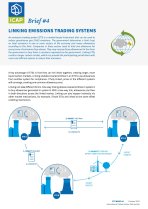
 © ICAPDateCategoryETS Briefs
© ICAPDateCategoryETS BriefsLinking Emissions Trading Systems (Brief 4)
Learn moreTeaser + metatagsLearn how linking emissions trading systems creates a larger carbon market, which can provide the participating jurisdictions with more cost-efficient options to reduce their emissions. Understand the different types of linking, why jurisdictions might link their systems, and the links in place around the world.
-
DateCategoryETS BriefsCover Image
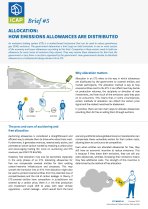
 © ICAPDateCategoryETS Briefs
© ICAPDateCategoryETS BriefsAllocation: How Emissions Allowances are Distributed (Brief 5)
Learn moreTeaser + metatagsIn an ETS, covered entities may receive allowances for free from the government or buy them in auctions. Learn about how governments decide to distribute allowances, why allocation matters, the pros and cons of each allocation method, how free allocation can work, and the approaches taken by systems around the world.
-
DateCategoryETS BriefsCover Image
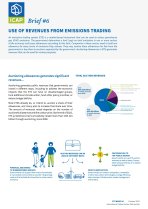
 © ICAPDateCategoryETS Briefs
© ICAPDateCategoryETS BriefsUse of Revenues from Emissions Trading (Brief 6)
Learn moreTeaser + metatagsAuctioning allowances in an emissions trading system generates revenues that can be used for various purposes. Learn how much jurisdictions receive in revenues, and the different ways it can be used – from supporting disadvantaged groups, funding further climate action, or contributing to the public budget.
-
DateCategoryETS BriefsCover Image
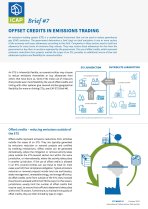
 © ICAPDateCategoryETS Briefs
© ICAPDateCategoryETS BriefsOffset Credits in Emissions Trading (Brief 7)
Learn moreTeaser + metatagsUnderstand how the use of offset credits, which represent emissions reductions from projects outside the scope of an ETS, provides an additional source of low-cost abatement options and flexibility for covered entities, issues of environmental integrity, and approaches taken by systems around the world.
-
DateCategoryETS BriefsCover Image
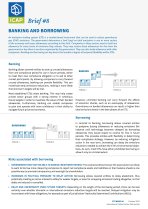
 © ICAPDateCategoryETS Briefs
© ICAPDateCategoryETS BriefsBanking and Borrowing (Brief 8)
Learn moreTeaser + metatagsBanking and borrowing are key levers that enable a degree of temporal flexibility within emissions trading system. Understand how they work, risks associated with each and restrictions that may be imposed, and which jurisdictions allow either mechanism.
-
DateCategoryETS BriefsCover Image
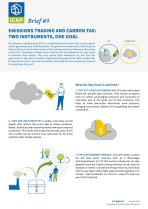
 © ICAPDateCategoryETS Briefs
© ICAPDateCategoryETS BriefsEmission Trading and Carbon Tax: Two Instruments, One Goal (Brief 9)
Learn moreTeaser + metatagsETS works by capping the total emissions allowed within the system. With a carbon tax, the government sets a tax rate and entities covered by the tax must pay this amount for every tonne they emit. Understand what these carbon pricing instruments have in common, how they differ, and which contexts might suit one over the other.
-
DateCategoryICAP Status ReportCover Image
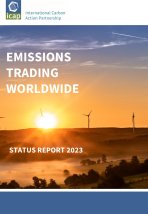
 © ICAPDateCategoryICAP Status Report
© ICAPDateCategoryICAP Status ReportEmissions Trading Worldwide: 2023 ICAP Status Report
Learn moreTeaser + metatagsCheck out the 2023 ICAP Status Report with the latest developments in emissions trading around the world.
The report includes:
🔹 comprehensive snapshot of the latest ETS developments
🔹 up-to-date factsheets on all systems
🔹 infographics that visualize the systems' characteristics
🔹 in-depth articles from policymakers and carbon market experts -
DateCategoryPapers and ReportsCover Image
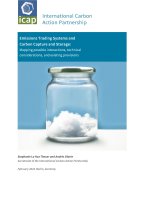
 © ICAPDateCategoryPapers and Reports
© ICAPDateCategoryPapers and ReportsEmissions Trading and Carbon Capture and Storage: Mapping possible interactions, technical considerations, and existing provisions
Learn moreTeaser + metatagsThis report explores how CCS is treated in different ETSs around the world; if and how ETSs could play a role in incentivizing the development and deployment of CCS applications; and the challenges and opportunities in developing the required regulation in this context.
-
DateCategoryPapers and ReportsCover Image
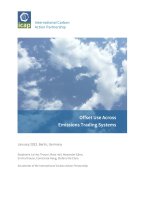
 © ICAPDateCategoryPapers and Reports
© ICAPDateCategoryPapers and ReportsOffset Use Across Emissions Trading Systems
Learn moreTeaser + metatagsAs market-based instruments, emissions trading systems are inherently flexible, as entities can decide to reduce their own emissions or buy emissions allowances from the market. Carbon offsets (or simply ‘offsets’) are a tool to further increase flexibility in reaching climate targets under ETSs, as they offer sectoral and geographical flexibility for jurisdictions to reduce greenhouse gas emissions outside of the scope of their ETS. This report …
-
DateCategoryPapers and ReportsCover Image
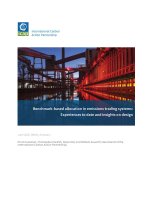
 © ICAP / unsplashDateCategoryPapers and Reports
© ICAP / unsplashDateCategoryPapers and ReportsBenchmark-based allocation in emissions trading systems: Experiences to date and insights on design
Learn moreTeaser + metatagsBenchmarking can protect against carbon leakage while setting incentives to reduce emissions, but their design entails complex trade-offs. This paper explores benchmark-based industrial allocation design and experiences, using insights from existing ETSs, and their implications for abatement and low-carbon investment incentives.
Publications
ICAP publishes a range of knowledge products on various ETS topics, including the flagship annual ICAP Status Report, short papers, and studies on selected ETS design or operation issues, as well as practical guidebooks and ETS briefs.
